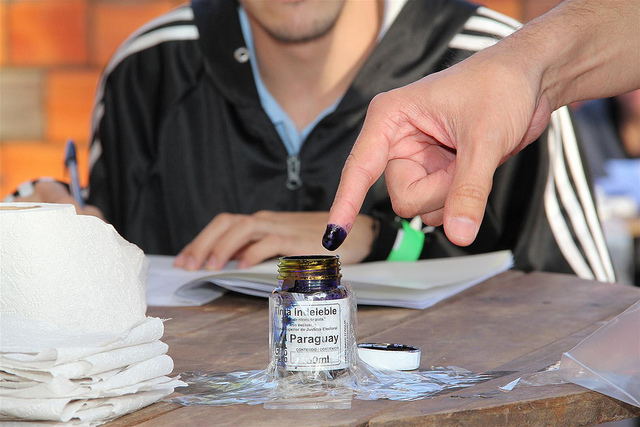
By Héctor Fariña*
Is it important to support compulsory voting? First, the answer is simple and forceful: yes, it is. For several reasons. Compulsory voting is mentioned in Article 118 of our Constitution, which establishes suffrage as a right, duty, and public function of the voter. Second, the Electoral Code also establishes the obligatory nature of the vote, a fine for non-compliance and it indicates who are the citizens who are exempted from the obligation to vote. In a country that seeks to be serious and wants to move forward, the minimum that is required is the respect for the Constitution and the laws. No other arguments would be necessary.
However, it is also necessary to raise political motives (understanding politics as the search for the common good). The marked absenteeism in our country is the result of discontent with politicians in general, indignation against corruption and impunity. But absenteeism, beyond being a legitimate form of protest, leads to nothing. On the contrary, it worsens the situation, since those who do not turn out to vote become accomplices of the status quo.
The absenteeism complicit in the current situation is part of a vicious circle. Corruption generates citizen apathy and this in turn becomes electoral absenteeism, which encourages politicians to motivate voters with money or other favors, and this money has its origin in corruption. We must realize that the citizen who is angry with the corruption of the country and decides to absent himself from the elections, ends up being an accomplice of the corrupt.
Thanks to absenteeism, what rules and defines the elections is the economic capacity of the candidates. If an election is defined by money and not by mass participation, then we could not even say that we are in a democracy, but in a plutocracy, that is, the government of money. It is urgent to improve the quality of our fragile democracy.
Regarding the quality of our democracy, it is alarming and horrifying to note who are the citizens absent from the elections. According to official data from the Superior Court of Electoral Justice (TSJE), 4,260,816 voters were eligible to vote in the 2018 presidential elections, of which 1,665,351 citizens were absent, representing 39.08% of the electorate. According to official data, 900,000 of the absentees were young people between 18 and 29 years of age.
It is really a catastrophe for our democracy that young people born in democracy are not interested in democracy. According to data from the TSJE, for the April 2023 elections, young people aged between 18 and 29 who are eligible to vote are 1,595,314, representing one third of the national electoral roll. Young people could define the next elections, but it is important to remember, they do not vote.
There is another element to be noted. Massive absenteeism, as it happened in the internal elections of the National Concertation, generates opportunities for electoral fraud. Siesta time, when not even flies were flying, was the opportunity to load votes, as was noticed in places such as the Natividad de María School in the Capital.
In short, absenteeism is tragic for democracy. Therefore, electoral participation is a way to fight the corruption of politicians and raise the quality of democracy.
What is the experience of the countries in the region? In South America, except for Colombia, where suffrage is free, and Venezuela, whose data are not reliable, the rest of the countries have compulsory voting and apply it. We have it and do not apply it. This leaves us, as in almost all rankings, in the worst places.
Let’s look at the levels of participation in recent elections:
| 1 | Uruguay 2019 Presidential | 90,13% |
| 2 | Bolivia 2020 Presidential | 88.42% |
| 3 | Chile 2022 Referendum | 85.86% |
| 4 | Ecuador 2022 Presidential | 82.62% |
| 5 | Brazil 2022 Presidential | 79.05% |
| 6 | Peru 2022 Municipal | 77.30% |
| 7 | Argentina 2021 Legislative | 71.72% |
| 8 | Paraguay 2021 Municipal | 60,55% |
The difference is remarkable. Among these cases, it is important to highlight the Chilean experience. They had compulsory voting and abandoned it for voluntary voting. In the Chilean presidential elections of 2021, the turnout in the first round was 47.33% and in the second round 55.64%. For the Constitutional Referendum of 2022, mandatory suffrage was chosen, bringing the turnout to no less than 85.86%. Based on this experience, the Chilean Senate again made voting compulsory for all elections.
Neither if Bad Bunny is the candidate, nor if politicians, priests, educators, social communicators, or influencers encourage participation, the current level cannot be improved. The only truly effective way is law enforcement.
absenteeism is tragic for democracy. Therefore, electoral participation is a way to fight the corruption of politicians and raise the quality of democracy.
Does the TSJE need a law to enforce compulsory voting? No. The TSJE already has all the legal tools to enforce compulsory voting. Law 635/95, which regulates electoral justice, gives the TSJE the duty and power to regulate compulsory voting by resolution. The order of priority of the laws protects the TSJE to comply with the law. In addition, Law 6858/2021 gave the TSJE the power to collect the electoral fines provided for in the electoral code.
The Superior Tribunal of Electoral Justice, the supreme body in electoral matters, has in its hands to improve the democratic quality of our country. It only lacks the political will.
* Héctor Fariña is a Salesian Priest, Pastor, and Rector of the María Auxiliadora Shrine. He has a bachelor’s degree in Theology and is a teacher of Social Sciences.
Cover image: Tribunal Superior de Justicia Electoral
